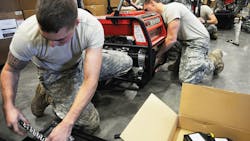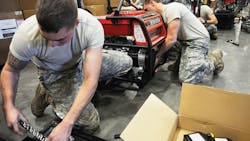Thanks to impending U.S. military budget cuts, tens of thousands of Army National Guard personnel will be moving into the civilian workforce beginning this fall.
Manufacturing execs are watching this development closely because many of those job hunters will have skills that could benefit their workforces.
One group uniquely poised to contribute as this wave of candidates starts looking for work is American Jobs for America's Heroes.
Since its founding two years ago, this campaign -- an alliance of the National Guard and three nonprofit groups -- has been matching civilian employers with guard members, veterans and their spouses.
The arm of the AJAH campaign tasked with bringing employers into the fold is a nonprofit based in Roswell, Ga., called the Center for America. That group announced in mid-March that it had signed up its 1,000th employer. And the number keeps growing: At press time it stood at 1,100.
The lead corporate sponsor for the American Jobs for America's Heroes campaign is Phillips 66 (IW 500/3), and two-thirds of the companies that have signed on are manufacturing businesses, says Steve Nowlan, director of AJAH and president of the Center for America.
"We started this campaign at the request of the Army National Guard two years ago because they recognized that 30% to 50% of the troops returning from Iraq and Afghanistan had no jobs," Nowlan says. "Many of these were young men and women who had been deployed two or three times and had never worked in the private sector."
Transferable Skills
The National Guard trains its personnel in more than 100 occupational specialties. Many of those fields involve skills that convert readily to the plant floor.
"They encompass things like working with the technical equipment in tanks and helicopters," Nowlan says. "Someone who has worked with the electronic equipment that manages a tank can easily make the transition to being a technician or technical supervisor in a manufacturing facility."
The AJAH campaign provides highly targeted matches for employers. "We give them a hands-on service to match their job specifications with individuals in the National Guard who are directly qualified," Nowlan says. "In a sense, we function like headhunters. We're not just grabbing the first name off the pile. We're actively seeking out the best possible matches."
Those matches are not based solely on skills, although that obviously is a key factor. The campaign also prides itself on coordinating job seekers' personality types with companies' cultures.
"If you have a company that's built around teams, we're going to help you find somebody who thrives in a team environment," Nowlan says. "If you have a company that's based on individuals going off on their own and conquering the world, then those are the kind of people we're going to bring you."
The next couple years will be a challenging time for the AJAH campaign as the military budget cuts take effect.
"The latest figures I saw said the Army National Guard's ranks will be reduced by 35,000 over the next two years," Nowlan says. "That's a significant hit. We'll be ready for it."
About the Author
Pete Fehrenbach
Pete Fehrenbach, Associate Editor
Focus: Workforce | Chemical & Energy Industries | IW Manufacturing Hall of Fame
Follow Pete on Twitter: @PFehrenbachIW
Associate editor Pete Fehrenbach covers strategies and best practices in manufacturing workforce, delivering information about compensation strategies, education and training, employee engagement and retention, and teamwork. He writes a blog about workforce issue called Team Play.
Pete also provides news and analysis about successful companies in the chemical and energy industries, including oil and gas, renewable and alternative.
In addition, Pete coordinates the IndustryWeek Manufacturing Hall of Fame, IW’s annual tribute to the most influential executives and thought leaders in U.S. manufacturing history.


